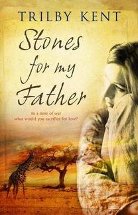Stones for my father by Trilby Kent

Alma Books, 2012. ISBN 978 1 84688 174 9.
Recommended. Having both South African Dutch and Canadian ancestry,
Trilby Kent has been moved to write this neat historical novel
concerning the experiences of a teenaged girl during the second Boer
War of 1899-1902.
Corlie Roux is a girl who gains the reader's sympathy from the first
page, as she struggles to please her domineering mother who, being
recently widowed, barely maintains the family farm on the Transvall.
Corlie is clearly unloved by her mother and is regarded as second
class which is an interesting parallel to the treatment of the
family's house servants by both the Dutch farmers and English
soldiers.
Corlie has a positive outlook, an innocent world view and great love
for her younger brothers, upon whom her mother dotes. Despite her
mother's unreasonable and sometimes excessive treatment, the
daughter admires and respects certain qualities in her character
which later become important when the family is detained in what the
British euphemistically refer to as 'Refugee camps'.
Some readers may be unaware that these were in effect concentration
camps, with large numbers of civilians being imprisoned in
impossible conditions where starvation and disease took a terrible
toll on life.
The author provides a realistic and restrained account of the
terrible suffering endured by those who were detained in response to
the reprisal attacks carried out by Boer Commandos, being farmers
who participated in guerilla warfare. Even allowing for narration
through the eyes of a young Boer girl however, Kent fails to portray
the position of British civilians and soldiers in the wider
perspective of the conflict. I think that authors who choose to
write historical fiction have some responsibility to reasonably
educate their readers and this otherwise great story was slightly
flawed by what appeared to be ancestral bias, to the extent that the
only benevolent character representing the British Crown was cast as
Canadian.
I recommend this book however, as this genre has great power to
enlighten young people regarding otherwise unknown episodes from
history and Kent's research and literary skill bring the location
and era to life.
As book covers are extremely important in appealing to library
patrons, I was intrigued by the illogical depiction of a young girl
wearing modern clothing. Whilst this may depict the author's
personal journey, it seemed to imply a time slip theme which is not
present in the text.
Rob Welsh